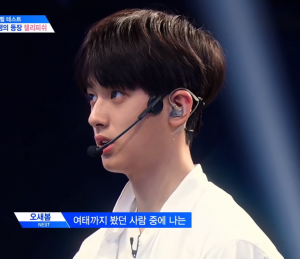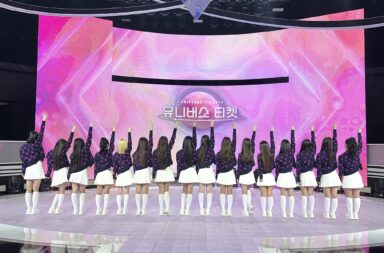The Produce Series is back for Season 4, and expectations are high. The ever-increasing contract lengths of the idol group formed each season is a testament to the series success. I.O.I had a year, Wanna One promoted 1.5 years, and Iz One has been signed on for 2.5 years. Now, the upcoming boy group is to promote for five years.
Each season, Mnet tries to incorporate a new element to keep audiences interested. This season, the element is the titular “X”. The “X” factor influences the show in a number of ways but most importantly, it is reflected in the final group’s formation. While the top 10 ranked trainees will make the cut for debut, the last spot will go, not to Rank 11, but to the trainee that has the highest total number of votes over the season. To put this in perspective, in Season 2, the 11th spot would likely have gone not to Ha Sung-woon, but to NU’EST’s JR.

Notably, trainees from the Big Three are also participating this year, although it has been rather anti-climatic. SM Entertainment put in a halfhearted effort by sending models from their subsidiary, Esteem, YG Entertainment’s trainees appear to be underprepared, and controversy has resulted in JYP Entertainment’s Yun Seo-bin being dropped from the show.
Despite the X factor, Episodes 1 to 3 followed a familiar formula. The show began with the obligatory Introduction Arc, introducing the trainees and their skills to TV viewers. At Episode 3, the show is entering the second arc with the start of the first battle (unsurprisingly named the “Group X Battle”).
Grade Evaluations dominated the Introduction Arc, with trainees graded according to their skills into Classes A, B, C, D and X. Instead of songs that highlighted their strengths, many trainees chose trendy songs (songs from reigning boy groups BTS, Exo and Wanna One). The decision to go trendy is a double-edged sword. Songs from these groups often contain high notes and difficult choreography and are not easy to pull off. Additionally, as audiences are familiar with the performance, expectations can be hard to meet. For some, like The Music Works’ trainees Song Yu-vin and Kim Kook-heon (of Myteen), this emphasized their skill, experience, and talent. But for others, such as Cre.ker Entertainment’s three-month-old trainee Kwon Hee-jun who chose BTS’s “Lie”, it showed how lacking their skills were.
As the trainers criticized the trainees, viewers criticized the trainers. Grades were inconsistent, often on the basis of “potential” rather than actual skill. The show milked this for further tension as trainees later struggled to keep up with their assigned Class. The inconsistency was reinforced in Episode 3 when grade re-evaluations led to major shuffling, particularly in Class A, where 10 of 16 trainees were downgraded.
The Produce Series has been heavily criticized for using its editing to manipulate voter opinion. By selectively highlighting trainees in a positive or negative light, or by leaving others completely out of the limelight, the show generates buzz and wins fans for the select few it wants to push. In part, the editing cannot be helped: there are 101 trainees to showcase in a limited amount of time. Dramatic storylines and growth arcs for popular trainees will bring viewers back for the next episode. From this point of view, the edit is practically a necessary evil.
However, the criticism is valid. To understand how influential editing can be, one need only look at the curious case of Nam Do-hyon (MBK Entertainment), currently at #5. Nam appeared earlier this year in another idol survival show, MBC’s Under Nineteen. Unlike Produce X 101, Under Nineteen gave Nam little screen time and poor styling. As a result, he had no lasting presence and was eliminated in the second elimination round.
Appropriated edited, even limited screen time can make a difference. Following their grade evaluations with positive reactions, MBK Entertainment’s Kim Yeong-san went from #93 in Episode 1 to #58 in Episode 3; and E Entertainment’s Won Hyuk jumped from last in Episode 2 to #57 in Episode 3, giving both trainees a fighting chance at surviving the first round of eliminations, which will cut those ranked under 60. At the opposite end of the spectrum, trainee Kwon Tae-eun (A.CONIC Entertainment) performed an embarrassing rendition of Sunmi‘s “Siren” and only negative reactions were aired. Tae-eun has remained in the lower range, from #74 in Episode 1 to #66 in Episode 3 .
In a press conference held prior to the start of the show, PD Ahn Joon-young addressed concerns regarding “evil editing” and assured audiences that he was trying his best to showcase each trainee as fairly as possible.
However, there is no marked difference in the “evil edit” and favoritism factor this year. The favoritism is obvious from the introductory stage itself. While members from at least five already-debuted idol groups are participating this season, the show mentioned only three – Myteen, Up10tion and Victon – along with their members’ struggles as nugu idols. At present, four out of six members from these groups are currently ranked within the top 20 and all are ranked within the top 35.

In contrast, no such special mention was given to In2it’s Kim Sung-hyun (Stone Music Entertainment) and
Uniq’s Cho Seung-youn (Yuehua Entertainment). In fact, these two trainees have been given negligible screen time. As a result, Sung-hyun has dropped from #22 in Episode 1, to #39 in Episode 3. Curiously, Cho has risen from #67 in Episode 1 to #38 in Episode 3, and will likely rise further given his strong performance the first battle round.
Cho’s rise shows audiences have their own minds. While it is certainly true that Mnet can influence voter opinion with screen time and story lines, this view alone does not give the entire picture. If that alone were the case, it would be impossible to explain why completely unknown trainees like Kim Min-gyu (Jellyfish Entertainment) and Kim Yo-han (OUI Entertainment) opened the rankings in Episode 1 at #1 and #3 respectively.

Justifying these ranks, Mnet gave the two Kims much screen time in the Introductory Arc. In the meantime, the angel edit has made it clear that they “deserve” these spots despite Min-gyu being graded into Class X. The same can be said of Starship Entertainment’s Song Hyeong-jun who has consistently ranked in the top 10 despite also initially being graded into Class X. The ability to draw fans is different from skill at vocals, rap or choreography, and Mnet knows it.
Perhaps this is why Mnet introduced Class X. With the experience of three seasons under its belt, Mnet knows that trainees with poor skills will also gain fans, and it is essential to ensure those who make the debut group are not complete beginners. An easy example is actor Lee Eugene (individual trainee), AKA Soo-han from the hit drama, Sky Castle. While the Class X’s trainees’ fate was initially left uncertain, it was later clarified that they would be trained in the basics. With the grade re-evaluations, all but one (Gost Entertainment’s Lee Sang-ho) moved up to a level where they were at least fit to be present on the “X1-MA” stage.
It may be noted that the show does not highlight all fan favorites. Case in point: Trainees Koo Jung-mo (Starship Entertainment) and Cha Jun-ho (Woolim Entertainment), currently ranked #9 and #11 despite not receiving any noticeable screen time. However, this is lower than their ranks in Episode 1, #2 and #4 respectively. This may indicate that their current ranks reflect only the large number of votes acquired prior to Episode 1, but they are now losing out to other trainees due to the lack of screen time. If so, their ranks will drop further once the first eliminations are over, and votes “re-set” to zero.
In other words, it can be argued that Mnet does indeed highlight its own “picks” but its picks include, apart from trainees it wants to groom (based on unknown criteria), trainees chosen by fans themselves. In its limited airtime, the show is giving viewers what they want, together with the editing needed to create a consistent narrative.
In addition, Produce X 101 is terribly biased in another less obvious way. Arguably the first important goalpost for the trainees is the all-important position of the Center in the title track, “X1-MA”. Previous Centers have made the debut group. As the title song needs to showcase 101 trainees, there are understandable limits on the vocals, rap and choreography. “X1-MA” is expectedly generic, if in tune with synth-based EDM trends in K-pop. But even within these constraints, “X1-MA” is a deplorable choice. Sung entirely in a high pitch, the song leaves no room for baritones and rappers.
This was evident in Episode 2’s training session, where the vocals trainers pushed trainees to open their throats, often painfully so. Trainer Lee Seok-hoon came down heavily on trainees that could not reach the required range, and praised those who strained their voices to do so. Not only did it seem harmful to the trainees’ vocal cords, but those who failed appeared to be less skilled.
It is worth noting that this year, viewers selected the Center (DSP Media’s Song Dong-pyo) from among the 15 Class A trainees. Crucially, for the purpose of selecting the Center, these trainees were introduced days before the rest and given an early chance to gain fans. With the nature of the song, however, it is clear that Class A trainees, who had a shot at the all-important Center position and had the advantage of an early introduction, could only have been a certain type of vocal.
Funnily enough, despite all of the above proficiency at editing and influencing bias, Mnet’s infamous skills failed the test of prior knowledge. As Yun Seo-bin was dropped, it was announced that he would be edited out of all future episodes. This proved easy in episode 2, where his grade evaluation was simply not aired, but much harder in Episode 3. It turns out Yun was the Center for Team “Mama” (Exo), and Mnet was facing an uphill editing battle.
As the team sat in a semi-circle discussing positions and distribution of parts, Yun was sitting in a corner and edited out. From there, as the show had to show scenes from the practice, it became harder and the editing became choppy. This is, unfortunately, most obvious in Team Mama’s final performance.
Without the Center in a single shot, the performance looked disjointed. Editors used either distance shots or close-ups and half shots. The very beginning was disconcerting, as a beautiful vocal could be heard but the singer (Yun) was not shown. In contrast, Team “Love Shot”, with its members chosen by Trainee Geum Dong-hyun (C9 Entertainment) for both skills and “manly charm” delivered a slick, sexy and mesmerizing performance.
The members of Team Mama, which lost the Battle, are already at a disadvantage as they are working with the less popular Exo song, and the editing will likely work further against them in voting over the following week.
This imbalance was corrected by the time Teams BTS walked onto the stage. Episode 3 featured only the first performance, Team “No More Dream” but it came with the expected dramatic behind the scenes story of conflict as the team struggled to keep up with Center Kim Hyeon-bin‘s (Source Music) enthusiasm. The final performance was cohesive, energetic and fun, making the viewer admire how far the team had come.
The Produce series’ true heart is the trainees. The show shines when it lays bare their hopes, dreams and insecurities, as well as the tremendous effort they put in into making a great stage. When we look at our favorite idols each comeback, we see the finished product, with only hints of the hours of work that went into it. Produce takes the effort that we only get hints of, and amplifies it so we get a true sense of the heart-wrenching endeavor it is to be a K-pop idol.
We are also reminded of how harsh, competitive and unfair the industry is. While watching YG Treasure Box, it seemed like Wang Jyun-hao and Hidaka Mahiro were skilled trainees; but here, amongst far more skilled and truly desperate trainees — such as outstanding vocalist Choi Soo-hwan (individual trainee) who was rejected at as many as 30 auditions, and actor Park Seon-ho (Sidus HQ), trainee of 10 and a half years — their performance is average at best.
As we conclude the introduction and enter into the thick of the competition, I expect the show, appropriately edited, will make for an even more compelling watch.
Sources: MBC, Naver [1] [2] [3] [4], ProduceX101 Mnet, YouTube





